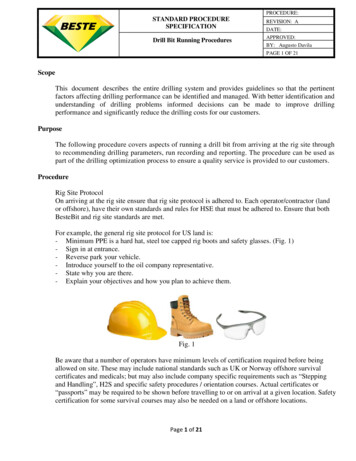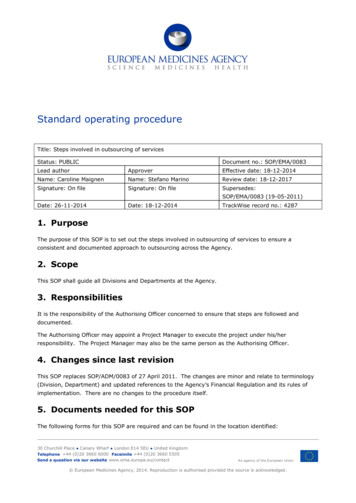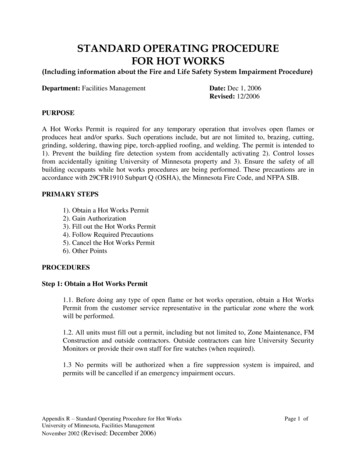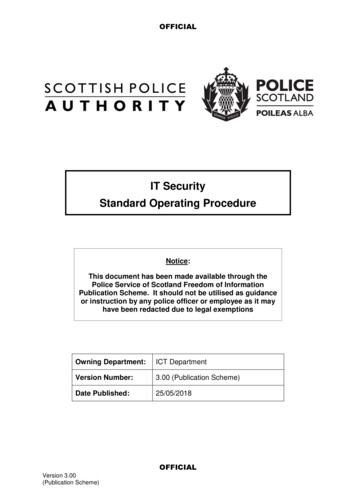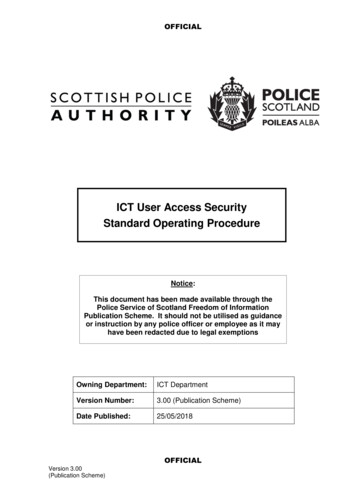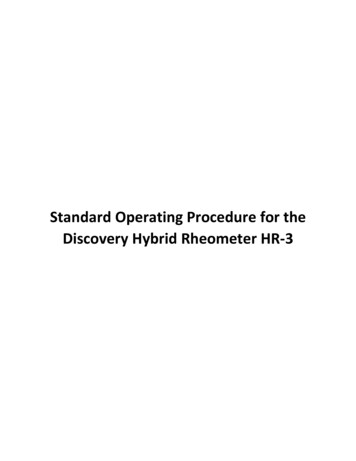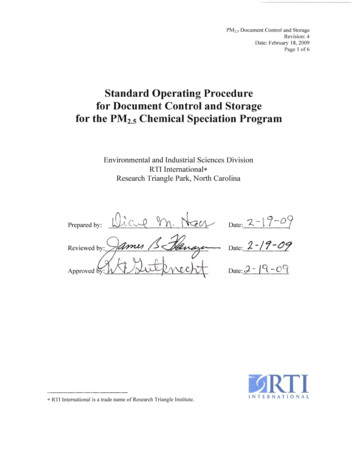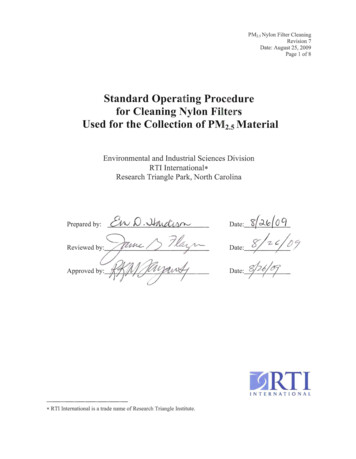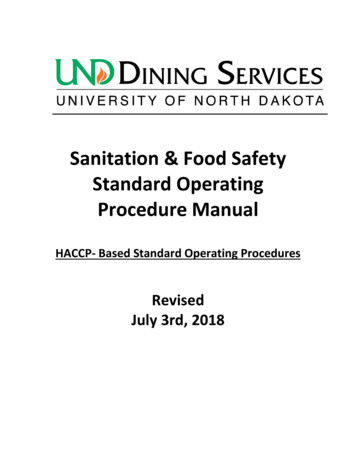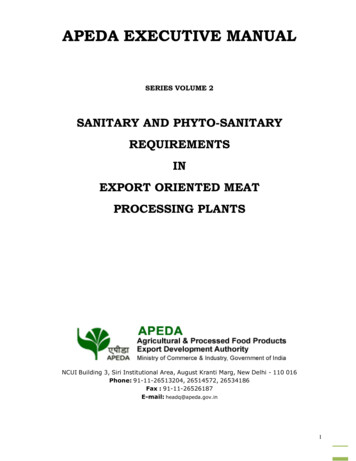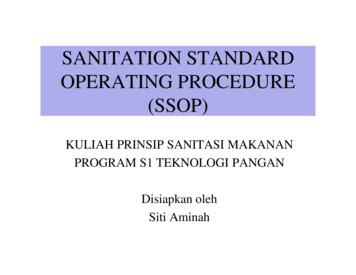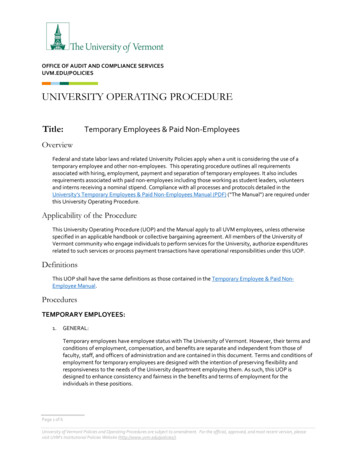
Transcription
OFFICE OF AUDIT AND COMPLIANCE SERVICESUVM.EDU/POLICIESUNIVERSITY OPERATING PROCEDURETitle:Temporary Employees & Paid Non-EmployeesOverviewFederal and state labor laws and related University Policies apply when a unit is considering the use of atemporary employee and other non-employees. This operating procedure outlines all requirementsassociated with hiring, employment, payment and separation of temporary employees. It also includesrequirements associated with paid non-employees including those working as student leaders, volunteersand interns receiving a nominal stipend. Compliance with all processes and protocols detailed in theUniversity’s Temporary Employees & Paid Non-Employees Manual (PDF) (“The Manual”) are required underthis University Operating Procedure.Applicability of the ProcedureThis University Operating Procedure (UOP) and the Manual apply to all UVM employees, unless otherwisespecified in an applicable handbook or collective bargaining agreement. All members of the University ofVermont community who engage individuals to perform services for the University, authorize expendituresrelated to such services or process payment transactions have operational responsibilities under this UOP.DefinitionsThis UOP shall have the same definitions as those contained in the Temporary Employee & Paid NonEmployee Manual.ProceduresTEMPORARY EMPLOYEES:1.GENERAL:Temporary employees have employee status with The University of Vermont. However, their terms andconditions of employment, compensation, and benefits are separate and independent from those offaculty, staff, and officers of administration and are contained in this document. Terms and conditions ofemployment for temporary employees are designed with the intention of preserving flexibility andresponsiveness to the needs of the University department employing them. As such, this UOP isdesigned to enhance consistency and fairness in the benefits and terms of employment for theindividuals in these positions.Page 1 of 6University of Vermont Policies and Operating Procedures are subject to amendment. For the official, approved, and most recent version, pleasevisit UVM’s Institutional Policies Website (http://www.uvm.edu/policies/).
Temporary employees are required to follow all applicable University policies and operating proceduresthat apply to University employees. Hiring departments are responsible for ensuring that employeesadhere to these policies and that applicable operating procedures are followed in a timely manner. Seethe Policy webpage for the full list of University Policies & Operating Procedures. Hiring departments arefurther required to comply with the hiring requirements outlined in the Temporary Employee Manual.Temporary positions should only be used to: meet the seasonal needs of the University;respond to a bona fide emergency;fill in for the temporary absence of an existing employee, or vacancy in an existing position; orperform a function that requires only intermittent, sporadic or ongoing employment that doesnot exceed 1,040 hours in any calendar year (i.e., 6 months of full-time employment at 40 hoursper week or 12 months employment at 20 hours per week).Unless an exception applies, a temporary employee should not continue to work in a temporary capacityafter a 12-month period. These individuals should be reclassified as to part-time or full-time faculty orstaff, as appropriate. Temporary positions should not be used if the function is ongoing andcontinuing. Exceptions are: Students hired as Work Study or Student Employees: Students may continue to be rehired inthese roles while enrolled in a degree program at the University.Internships or Apprenticeships: These positions may have a duration of up to two years. Pleasesee Temporary Hourly Employees Interns/Apprentices definition, for position requirements anddetails. Please note: This type of internship has an established employment relationship with theuniversity and is defined separately from the Non-Employee Intern paid an approved stipend.It is a violation of University policy to utilize temporary positions to circumvent the policies and purposesof regular employment. Doing so could also increase the University’s risk of violation of federal and/orstate law.2.HIRING TEMPORARY EMPLOYEES:When an employee is completing short-term, project-based, or seasonal work for the University and theemployee does not otherwise have an active job code with the University, they should be hired as atemporary employee using a job code listed in the Manual. In certain situations, it may be appropriate topay an individual/company as an independent contractor. Refer to the Employee or IndependentContractor section of the Manual.If the employee has an existing active job code, unless an exception applies, this employee will require anadditional temporary employee job code if they are receiving compensation for any of the followingreasons: Work completed in a different department.Work unrelated to the employee’s primary job.Work completed between appointments for an employee whose primary job is paid via kronosand works a less than 12-month term.Page 2 of 6University of Vermont Policies and Operating Procedures are subject to amendment. For the official, approved, and most recent version, pleasevisit UVM’s Institutional Policies Website (http://www.uvm.edu/policies/).
Exceptions to the additional job code requirement include: Exempt staff or faculty with 1.0 FTE completing de minimis work as defined herein. Thiscompensation may be paid on the employee’s primary job via an additional pay form;Faculty teaching in another department: Faculty teaching credit bearing course(s) in a differentdepartment during the term of their primary appointment. This compensation may be paid onthe employee’s primary job via an additional pay form; orCDE Earnings: Work paid on the Continuing & Distance Education (CE) earnings code. Thiscompensation may be paid on the employee’s primary job via an additional pay form.In addition, departments are required to follow University policies and operating procedures as theypertain to reference checks and background checks. At a minimum:Reference Checks:Hiring supervisors should complete a minimum of three professional reference checks, including at leastone direct supervisor, prior to making an offer. If a reference is neutral or negative, hiring supervisorsshould discuss the situation with their department head and carefully consider whether to extend anoffer of temporary employment.All temporary employees should be asked if they have previously worked at the University of Vermont. Ifso, a reference check with their previous supervisor is encouraged. At minimum, hiring managers shouldbe reaching out to their Labor and Employee Relations Representative or to Human Resource Services toensure that the candidate was not terminated from the University for misconduct or performance issues,as additional investigation prior to an offer of employment may be necessary. Hiring supervisors shouldalso ask each finalist candidate if they have family members working at the University of Vermont, and ifso, in which departments. Temporary employees should not report, directly or indirectly, to a familymember within the organizational structure.Background Checks:Background checks must be completed for any position which includes the following: working with minors or other vulnerable populations;handling cash or other financial transactions;driving a University vehicle;access to confidential information;access to private areas such as dorm rooms, showers, or locker rooms;access to controlled substances;access to valuable research equipment;access to Physical Plant operational systems;access to research animals.If the background check results indicate one or more convictions, the department should consult withtheir Labor and Employee Relations Representative prior to hire.If a decision is made to not offer the job to the candidate in whole or in part due to this information, thedepartment must initiate the adverse action process.3.CLASSIFICATION & COMPENSATION:In order to reduce the risk of violation to federal and state employment laws, including FLSA, hiringdepartments are required to classify temporary employees in the proper categories as outlined in theManual. Hiring departments should contact Human Resource Services with questions prior to thePage 3 of 6University of Vermont Policies and Operating Procedures are subject to amendment. For the official, approved, and most recent version, pleasevisit UVM’s Institutional Policies Website (http://www.uvm.edu/policies/).
submission of hiring forms to ensure that pay rate and potential overtime implications have beenaddressed.4.APPROVAL TO BEGIN WORK:Temporary employees may not begin working for the University until all applicable required documentshave been received and approved by Human Resource Services. Details regarding required documentsfor temporary employees, refer to the Temporary Employee Job Codes Outline section of the Manual.Typically, approval occurs one day following the submission of paperwork to Human Resource Services.Ensuring that documents are approved prior to the employee’s start date ensures that job codes and payrates are appropriate and ensures payment to the employee in the required timely manner.5.HIRING VENDORS/EMPLOYMENT AGENCIES:To reduce the risk of violation to federal and state employment laws, it is preferred to hire temporaryemployees through one of the Universities approved staffing agencies whenever possible. TheUniversity has contracts with staffing agencies: Spherion, Westaff and Adecco. Refer to the Manual formore information on UVM’s current vendors/agencies.NON-EMPLOYEES WITH APPROVED NOMINAL STIPEND1.GENERAL:To reduce the risk of violation to federal and state employment laws, the University has established theseprocedures related to non-employees receiving nominal stipends. Non-employees receiving stipends aregenerally volunteer, student leader and intern positions. In the event that a department has a nonemployee position that does not fall into one of these categories, they should contact Human ResourcesServices for guidance.Non-employee student leader and intern positions generally should not exceed one semester in duration.However, while the individual is enrolled full-time as a UVM student (graduate or undergraduate), theymay continue to be active in these roles while they complete their degree(s).Non-employee volunteers, student leaders, and interns are required to follow all applicable Universitypolicies and operating procedures that apply University students and affiliate personnel. Departmentsare responsible for ensuring that students and affiliates work within these policies and that applicableoperating procedures are followed in a timely manner.See the Policy webpage for the full list of University Policies & Operating Procedures.2.METHODS OF PAYMENT:Stipends may be paid in a lump sum upon the completion of the non-employee’s position or regularly(each payroll during the position.) If the payment is provided each payroll the stipend must be paidregardless of the completion of the position; it may not be withheld if the individual does not completeall tasks. It is recommended that the stipend be paid as a lump sum during the pay period in which theexpected end date is in. Departments must provide an accurate estimate of the number of hours theindividual will perform tasks (tracked on the additional pay form.)Page 4 of 6University of Vermont Policies and Operating Procedures are subject to amendment. For the official, approved, and most recent version, pleasevisit UVM’s Institutional Policies Website (http://www.uvm.edu/policies/).
3.ACTIVATING/DEACTIVATING RECORDS:Non-employee may not begin their position until after all applicable required documents have beenreceived and approved by Human Resource Services and the University of Vermont’s InternshipCoordinator (as applicable.)Typically, approval occurs one day following the submission of paperwork. Ensuring that documents areapproved prior to when the student leader/intern begins the position ensures that job codes and stipendsappropriate, and that the stipend is provided to the individual as expected. For details regarding whatdocuments are required in order to activate and pay these non-employees employee, please see theNon-employees with Approve Stipend Outline.If the non-employee’s record has been deactivated within the last 3 months, the department may submita Non-Employee Reactivation Form. This is only appropriate if the details of the record remainunchanged and the individual will be completing the same tasks. In certain situations, it may bepermissible for the stipend to be increased as long as it remains “nominal.”Non-employee records will be automatically deactivated after six months of non-payment. Thisautomatic deactivation occurs regardless of the expected end date of the positionContactsQuestions concerning the daily operational interpretation of this UOP should be directed to the following:Title(s)/Department(s):Contact Information:Human Resources Serviceshrsinfo@uvm.eduDean’s Office Human Resource Representativeswww.uvm.edu/hrs/contactPayroll and Tax Servicestaxadmin@uvm.eduStudent Employment iagrams Additional Pay FormFLSA FlowchartNon-Employee Reactivation FormRelated Documents/Policies Division of Financial Forms WebsiteEmployee vs. Independent Contractor PolicyRecruiting Resources WebsiteTemporary Employee & Paid Non-Employee ManualUniversity Operating Procedures for I-9Training/EducationTraining will be provided on an as-needed basis as determined by the Approval Authority or the ResponsibleOfficial.Page 5 of 6University of Vermont Policies and Operating Procedures are subject to amendment. For the official, approved, and most recent version, pleasevisit UVM’s Institutional Policies Website (http://www.uvm.edu/policies/).
About This ProcedureResponsibleOfficial:Vice President for Finance andAdministrationApprovalAuthority:Vice President for Finance andAdministrationAffiliatedPolicyNumber(s):V. 4.6.4Effective Date:November 3, 2020RevisionHistory:NonePage 6 of 6University of Vermont Policies and Operating Procedures are subject to amendment. For the official, approved, and most recent version, pleasevisit UVM’s Institutional Policies Website (http://www.uvm.edu/policies/).
(each payroll during the position.) If the payment is provided each payroll the stipend must be paid regardless of the completion of the position; it may not be withheld if the individual does not complete all tasks. It is recommended that the stipend
